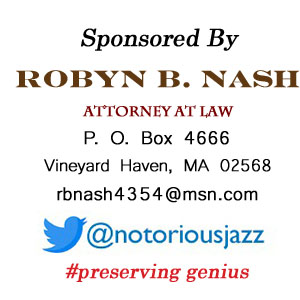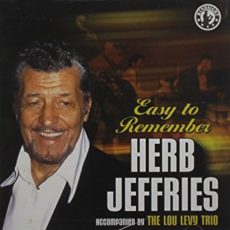
Daily Dose Of Jazz…
Herb Jeffries was born Umberto Alexander Valentino on September 24, 1913 in Detroit, Michigan of mixed heritage. Never knowing his father who died in World War I and grew up in a rooming house in a mixed neighborhood without encountering severe racism as a child. Showing great interest in singing and intensely musical from boyhood, during his formative teenage years he was often found hanging out with the Howard Buntz Orchestra at various Detroit ballrooms. After the Wall Street Crash of 1929, he dropped out of high school to earn a living as a singer.
He began performing in a local speakeasy where he caught the attention of Louis Armstrong, who gave the teenager a note of recommendation for Erskine Tate at the Savoy Ballroom in Chicago, Illinois. Knowing that Tate fronted an all-black band, Jeffries claimed to be a Creole, and was offered a position as a featured singer three nights a week. Later he toured with the Earl Hines Orchestra through the Deep South.
The 1940s and 1950s saw Herb record for a number of labels, including RCA Victor, Exclusive, Coral, Decca, Bethlehem, Columbia, Mercury and Trend. His album Jamaica, recorded by RKO, is a concept album of self-composed calypso songs. He often used makeup to darken his skin in order to pursue a career in jazz and to be seen as employable by the leading all-black musical ensembles of the day.
He also starred in several low-budget race Western feature films aimed at black audiences from 1937 to 1939, Harlem on the Prairie, Two-Gun Man from Harlem, Rhythm Rodeo, The Bronze Buckaroo and Harlem Rides the Range. He also acted in several other films and television shows billed as Herbert Jeffrey, Herbert Jeffries or the Sensational Singing Cowboy.
Singer and actor Herb Jeffries, who was the only Black singing cowboy star in Hollywood has a star on the Hollywood Walk of Fame, was inducted into the and a Golden Palm Star on the Palm Springs Walk of Stars, passed away on May 25, 2014 in Los Angeles, California.
More Posts: vocal
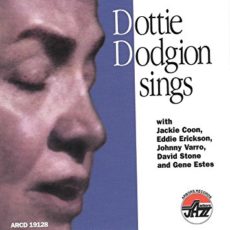
Daily Dose Of Jazz…
Dottie Dodgion was born Dorothy Rosalie Giaimo on September 23, 1929 in Brea, California. Growing up in the San Francisco Bay Area as a child, she sang in the band led by her drummer father and as a teenager sang with Charles Mingus. She began playing drums in the 1950s though she was discouraged by her husband Monty Budwig, but receiving encouragement to play from Jerry Dodgion, she subsequently divorced Budwig to marry Dodgion.
She worked with Carl Fontana in Las Vegas, Nevada toward the end of the decade and then relocated to New York City in 1961. There she played in Benny Goodman’s ensemble for about a week, then moved on to work with Marian McPartland and Eddie Gomez, Billy Mitchell and Al Grey, Wild Bill Davison, and Al Cohn and Zoot Sims over the course of the 1960s. In the early 1970s she worked with Ruby Braff and Joe Venuti, then played alongside her husband in Germany with Walter Norris and George Mraz.
Dottie and Jerry separated in the late Seventies and she moved to p style=”text-align: justify;”>Washington, D.C. for a time, where she was musical director for the club The Rogue and Jar. After moving back to New York City she worked in the 1980s with Melba Liston, George Wein, Michael and Randy Brecker, Frank Wess, Jimmy Rowles, Carol Sloane, Pepper Adams, Tommy Flanagan, Roland Hanna, Sal Nistico, Herb Ellis, Chris White, Bob Cranshaw, Joe Newman, and Harold Danko. After returning to the Bay Area in 1984 she played regularly at the Monterey Jazz Festival.
Drummer and singer Dottie Dodgion stopped being active in jazz at age 87. She died five years later on September 17, 2021, in a hospice in Pacific Grove, California, after suffering a stroke.
<
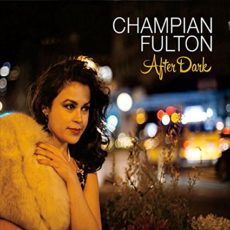
Daily Dose Of Jazz…
Champian Fulton was born on September 12, 1985 in Norman, Oklahoma to a jazz trumpeter father whose friends were Clark Terry and Major Holley. At five she took piano lessons from her grandmother and after trying trumpet and drums, she returned to piano and singing. When her father was hired to run the Clark Terry Institute for Jazz Studies, the family moved to Iowa. She went to jazz summer camp, where she founded the Little Jazz Quintet.
One of her early influences was Dinah Washington, particularly the album For Those in Love, which she played often as a young girl. She also admired Sarah Vaughan, Nat King Cole, Sonny Clark, Red Garland, Hampton Hawes, Wynton Kelly, Thelonious Monk, and Art Tatum.
Fulton graduated from high school in 2003, then attended State University of New York at Purchase, where she studied with trumpeter Jon Faddis.[4] After graduating, she moved to New York City to pursue a career as a pianist and vocalist. She has performed at various venues playing with Jimmy Cobb, Scott Hamilton, Frank Wess, Lou Donaldson, and Louis Hayes.
She has worked with the Lincoln Center for the Performing Arts, the Litchfield Jazz Camp and Rutgers University. In late 2015, she joined the faculty of the Jazz Arts Academy in association with the Count Basie Theatre Education Department to offer workshops in jazz vocals and jazz piano during the summer. In 2014 she received the Rising Star Female Vocalist Critics Poll from Down Beat Magazine. As a leader she has recorded eight albums and continues to perform and record.
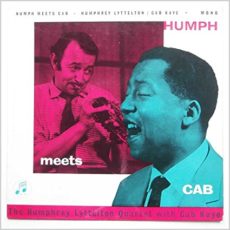
Daily Dose Of Jazz…
Cab Kaye was born Nii-lante Augustus Kwamlah Quaye on September 3, 1921 on St. Giles High Street in Camden, London to a musical family of Ghanaian ancestry. After his father’s death when he was four months they moved to Portsmouth where he was introduced to the timpani by a soldier who taught him how to count and use the mallets. At fourteen, he began visiting nightclubs where Black musicians were welcome, and where he eventually won first prize in a song contest and a tour with the Billy Cotton band. In 1936, he recorded his first song Shoe Shine Boy under the name Cab Quay.
During 1937 Kaye played drums and percussion with Doug Swallow and his band, the Hal Swain Band and Alan Green’s band. Until 1940 he sang and drummed with the Ivor Kirchin Band, with Steve Race on piano, in the Paramount Dance Hall on Tottenham Court Road. When a guest was refused entrance because of their skin colour, Kaye refused to perform, the incident led to the regular acceptance of black people and the venue grew into a sort of Harlem of London.
He would go on to play with Britain’s first black swing bandleader Ken “Snakehips” Johnson and His Rhythm Swingers, play in several radio broadcasts and joined the British Merchant Navy before his mother and Johnson were killed in bombings during World War II. A move to New York saw him playing in Harlem and Greenwich Village with Roy Eldridge, Sandy Williams, Slam Stewart, Pete Brown, Charlie Parker, Dizzy Gillespie and Willie “The Lion” Smith. Returning to London in 1943 he sang with clarinetist Harry Parry, then formed a band that included 16-year-old saxophonist Ronnie Schatt (Ronnie Scott), Ralph Sharon and Dick Katz on piano. Following this he sang with Vic Lewis, Ted Heath, Tito Burns and Jazz In The Town. Leading his own bands Ronnie Scott, Johnny Dankworth and Denis Rose. Throughout his career he formed several bands that included Mary Lou Williams, Dizzy Reece, Dennis Rose, Denny Coffey, Dave Smallman, Pat Burke and performed with Billy Daniels, Benny Payne Eartha Kitt, and 16 year old Shirley Bassey among numerous others
Opening his own club in Amsterdam he performed with visiting musicians such as Rosa King, Slide Hampton, Aart Gisolf, Dirk-Jan “Bubblin” Toorop, David Mayer, Gerrie van der Klei, Cameron Japp, Max Roach, Oscar Peterson, Pia Beck and others. During this period Cab played all the major festivals until the 1990s when he was diagnosed with mouth floor cancer that resulted in the loss of the ability to speak. On March 13, 2000 vocalist, pianist, guitarist, drummer and composer Cab Kaye, also known as Cab Quay, Cab Quaye and Kwamlah Quaye and who recorded for the Melody Maker label, passed away at the age of 78.
More Posts: composer Instruments Vocals,drums,guitar,piano,vocal
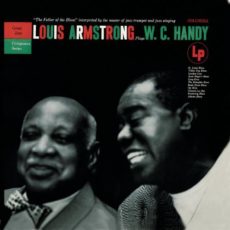
Daily Dose Of Jazz…
Velma Middleton was born September 1, 1917 in Holdenville, Oklahoma and later moved with her parents to St. Louis, Missouri. She started her career as a chorus girl and dancer, and throughout her career performed acrobatic splits on stage despite being overweight. After working as a solo performer, and singing with Connie McLean’s Orchestra on a tour of South America, she joined Louis Armstrong’s big band in 1942, and appeared with him in soundies.
When Armstrong’s orchestra disbanded in 1947, Velma joined his All-Stars, a smaller group. She was often used for comic relief, such as for duets with Armstrong on That’s My Desire and Baby, It’s Cold Outside. She did occasional features, recorded eight tracks as a solo singer for Dootone Records in 1948 and 1951. Although she was not widely praised for her voice as average but reasonably pleasing and good-humored, Armstrong regarded her as an important and integral part of his show.
While touring with Armstrong in Sierra Leone in 1961 she had a stroke or heart attack in January and passed away the following month on February 10, 1961 in a hospital in Freetown, Sierra Leone. Vocalist Velma Middleton was 43 years old.
More Posts: vocal



